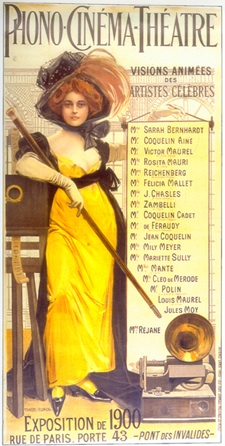Lauritz Carl Constantin Philipsen (1 December 1859 in Copenhagen; died 23 August 1925 Copenhagen) [1] is credited as one of the founders of the Cinema of Denmark.
Philipsen, a photographer toured Scandinavian nations from 1898 with his magic lantern [2] He eventually sold his photography business to enter the emerging world of cinema on a full-time basis.
Philipsen opened Denmark's first viable cinema the 158 seat Kosmorama in 1904 in Copenhagen [3] He opened 26 more Kosmorama Cinemas in Denmark between 1905 and 1906. [4] Though the majority of cinemas seated at most 300-400 people, Philipsen opened the large Palace Cinema seating 2500 and using a 30 piece orchestra in to former site of Copenhagen's Grand Central Railway station [5]
In addition to owning cinemas Philipsen began producing his own films from 1909.
His son Preben Philipsen (1910–2005) named his Constantin Film company after his father.
Rialto Film is a German motion-picture production company headquartered in Berlin. It is named after the Rialto in Venice, and used as its production logo an image of a gondola in front of the Rialto Bridge.

Roméo et Juliette is a 1900 French film adaptation of the classic and famous William Shakespeare play, Romeo and Juliet.
Preben Philipsen was a Danish film producer. He produced 41 films between 1949 and 1975, and co-founded Constantin Film with Waldfried Barthel in 1950. He was born in Copenhagen, Denmark to Constantin Philipsen and his wife Marie Helene and died in Klampenborg.
Les Misérables is a 1909 American silent historical drama proto-feature film. The proto-feature movie is based on the 1862 French novel of the same name by Victor Hugo, and stars Maurice Costello and William V. Ranous. It was directed by J. Stuart Blackton.
Events from the year 1904 in Denmark.
Maharashtra Film Company was an Indian film production company, established by Baburao Painter in Kolhapur. Established in 1918, it was a silent film studio, which was a pioneer in Maharashtra and Marathi cinema, under the patronage of the Shahu Maharaj, the Maharaja of Kolhapur. It released the first significant historical, Sairandhari, released in Pune 7 February 1920. In the coming decade the only other major company was Dada Saheb Phalke's Hindustan Film Company. It made numerous films till the advent of talkies in 1931, but started collapsing after V. Shantaram left in 1929, to form Prabhat Film Company, it finally closed down in 1931.

The Motion Picture News was an American film industry trade paper published from 1913 to 1930.
Søren Estrup Alfred Lind was a Danish cinematographer, screenwriter, and film director of the silent era. Lind was a prominent director in early Scandinavian cinema, and also worked in the German film industry. He is believed to have shot the earliest surviving footage of Iceland from 1906.
Stuart Webbs was a fictional detective who appeared in a series of German films and serials during the silent era. Webbs was one of a number of detectives with English-sounding names to appear in German cinema of the era. Like his contemporaries such as Joe Deebs he was modeled on Sherlock Holmes. Webbs was the most popular of the group. His original film series ran from 1914 to 1926 and he continued to appear in other later films such as The Green Monocle (1929).
The Clarendon Film Company was a British film studio founded by Percy Stow and Henry Vassal Lawley.
Eugenio Perego (1876–1944) was an Italian film director of the silent era. During the 1920s he directed a number of comedy films starring Leda Gys.
Theodora is a 1914 Italian silent historical film directed by Roberto Roberti and starring Bice Waleran.
The Sinful Woman is a 1916 Italian silent film directed by Roberto Roberti.
Darkness is a 1916 Italian silent film directed by Roberto Roberti and starring Lina Simoni.
The Serpent is a 1920 Italian silent film directed by Roberto Roberti and starring Francesca Bertini.
Countess Sarah is a 1919 Italian silent film directed by Roberto Roberti and starring Francesca Bertini.

Shakuntala is a 1920 film directed by Suchet Singh.
Cinema in Togo began with German colonial filmmakers visiting Togoland. The French attempted to suppress cinema in French Togoland. After the Togolese Republic gained independence in 1960, Togo's national government encouraged cinema, though government support for cinema lapsed when French funding was withdrawn in the 1990s. More recently, however, the film industry is once again growing in Togo.
Ernesto Maria Pasquali (1883–1919) was an Italian pioneering film producer and director. Originally a journalist he was employed by Ambrosio Film before he set up the Turin-based Pasquali Film, one of Italy's leading production companies. Shortly after his death in 1919 it was subsumed into larger conglomerate Unione Cinematografica Italiana.
Events in 1859 in animation.